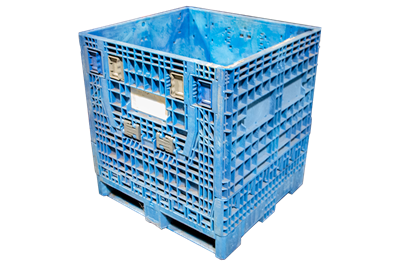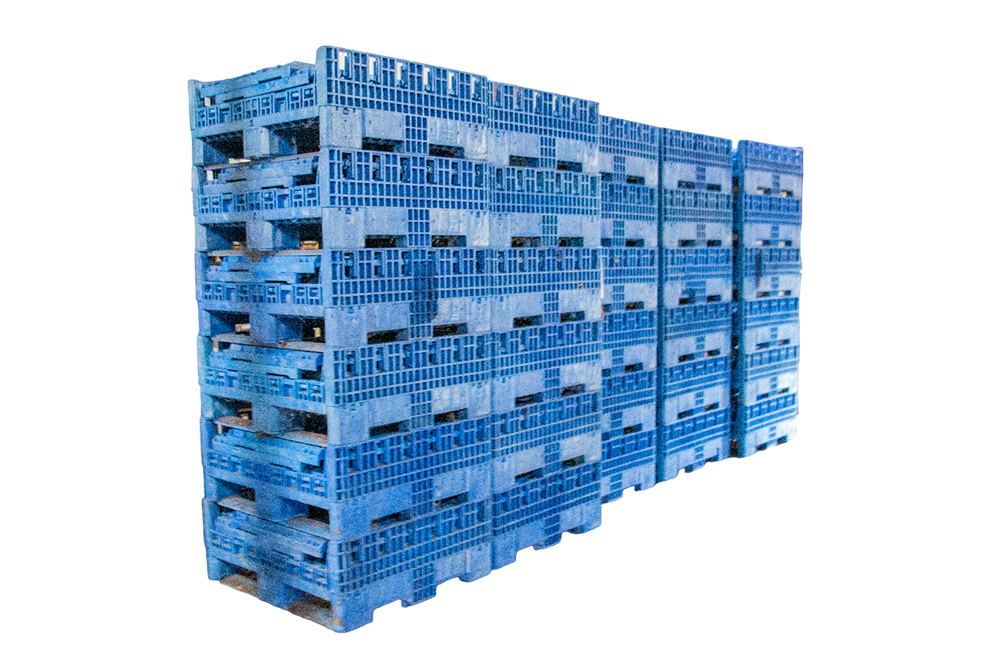The Ultimate Overview to Choosing the Right Bulk Containers for Your Company Requirements
Selecting the suitable bulk containers is critical for any organization that relies upon effective logistics. Different kinds of containers exist, each created for certain products and applications. Factors such as size, material compatibility, and regulative standards play a significant duty in this decision-making process. Understanding these components can bring about improved operational performance. However, lots of businesses neglect necessary elements that can boost their overall performance and sustainability. What are these factors to consider?
Comprehending Different Kinds Of Bulk Containers
Mass containers function as essential tools for businesses seeking reliable storage space and transportation options. These containers are available in different kinds, each developed to fulfill details functional requirements. One usual kind is the intermediate mass container (IBC), which is ideal for fluid and granulated products, using an equilibrium of capacity and maneuverability. An additional prominent choice is the bulk bag, or FIBC, ideal for dry, flowable products. These flexible containers are lightweight and can be easily transported and stored. For much heavier products, inflexible mass containers are typically utilized, providing sturdiness and stability for risk-free handling. Furthermore, there are customized containers tailored for dangerous products, ensuring conformity with safety and security laws. Recognizing the distinct characteristics of these mass container types enables companies to make educated decisions that maximize logistics and minimize expenses. By choosing the right container, companies can enhance their functional performance and enhance their supply chain processes.
Secret Material Factors To Consider for Bulk Containers
When choosing mass containers, it is vital to contemplate the products made use of in their construction. Elements such as strength, sturdiness, and chemical compatibility play a critical role in ensuring the containers fulfill details operational demands. Additionally, weight and transportability issues can affect both effectiveness and transportation logistics.
Material Toughness and Stamina
Toughness and strength are essential consider picking materials for bulk containers, as they directly influence the container's capacity to endure various ecological conditions and managing processes. Materials such as high-density polyethylene (HDPE), polypropylene, and stainless-steel are commonly favored for their robust buildings, providing resistance to temperature, abrasion, and effect variations. The option of material also affects the overall life expectancy of the container; stronger materials typically cause less frequent substitutes, causing cost savings with time. In addition, the weight of the product can influence delivery prices and convenience of handling. Companies should consider their details operational atmospheres and the potential for damage to ensure peak durability and strength in their bulk container selection.
Chemical Compatibility Factors
Comprehending chemical compatibility is essential for picking mass containers, as the materials utilized have to resist the details substances they will hold. Various elements affect compatibility, including the chemical nature of the components, temperature, and duration of storage space. For circumstances, harsh chemicals may call for containers made from stainless steel or specialized plastics that withstand deterioration. Furthermore, reactive materials can produce heat or gases, demanding aired vent or pressure-rated containers. The option of container material, whether polyethylene, steel, or polycarbonate, need to line up with the chemical homes of the saved substances to avoid leakages or breaches. Eventually, an extensive examination of these compatibility elements ensures secure handling and storage, securing both workers and the setting while maintaining item stability.
Weight and Transportability Concerns
Selecting mass containers involves not only evaluating chemical compatibility yet also taking into consideration weight and portability. Companies should evaluate the ease of handling and transportation to optimize performance. Light-weight products like high-density polyethylene (HDPE) or light weight aluminum can help with less complicated motion and decrease shipping expenses. On the other hand, larger containers might provide improved durability but can hinder movement, specifically in atmospheres needing frequent relocation. In addition, the style of the container should enable for convenient lifting and stacking, making sure ergonomic security for employees. Companies should also think about the framework offered for transportation; for instance, containers suitable with forklifts or pallet jacks can improve procedures. Eventually, the appropriate equilibrium in between weight and mobility straight affects functional efficiency and price performance.
Sizing Your Mass Containers for Ideal Effectiveness
When sizing bulk containers, organizations must thoroughly assess the measurements needed to suit their particular items. Additionally, weight ability is a crucial factor that influences performance and safety and security throughout transport and storage. Effective sizing not just makes the most of area however likewise maximizes operational workflows.
Determining Container Dimensions
Selecting the best dimensions for bulk containers is essential for maximizing performance in storage and transportation. Businesses should examine their specific requirements, thinking about factors such as readily available space, the nature of the goods being saved, and the approaches of transport utilized. Precise dimensions ensure that containers fit ideally in cars and Extra resources storage facilities, lessening thrown away space and lowering handling time. Standard dimensions can offer benefit, however custom-made dimensions might be required for one-of-a-kind needs or to fit details products. In addition, it is very important to evaluate piling capacities and accessibility, as these elements affect general functional effectiveness. Ultimately, the appropriate measurements lead to enhanced company and streamlined logistics, profiting the total efficiency of the organization.
Weight Ability Considerations
Understanding weight ability is crucial for companies intending to optimize their bulk container performance. The weight capability of a container directly impacts storage capacities, transport logistics, and total operational costs. Choosing containers with the proper weight limits guarantees that services can safely store and deliver their products without taking the chance of damages or conformity problems. Overloading containers can lead to structural failures, while underutilizing ability cause thrown away resources. It is necessary for businesses to evaluate their item weights and take into consideration any type of regulatory demands when picking containers. In addition, variables such as the type of product, planned use, and ecological conditions must also affect weight ability choices. By evaluating these components, businesses can enhance performance and ensure a streamlined supply chain.
Governing Compliance and Safety Specifications

Governing compliance and security standards play a crucial function in the selection of mass containers for businesses. Organizations has to ensure that their containers satisfy various guidelines established by neighborhood, nationwide, and international authorities. These standards frequently relate to material security, architectural honesty, and appropriate labeling, which help protect against accidents and guarantee the risk-free transport of goods.
In addition, adherence to industry-specific standards, such as those from the Fda (FDA) or the Occupational Security and Health And Wellness Administration (OSHA), is crucial for firms taking care of dangerous products or food products. Non-compliance can result in penalties, lawful problems, or damages to a company's online reputation.
Businesses should additionally think about the container's compatibility with the products being saved or transferred to prevent contamination or chain reaction (used collapsible containers). To summarize, recognizing and executing regulative conformity and security criteria is essential for the responsible and effective use bulk containers
Sustainability Options for Eco-Friendly Mass Containers

Business are also exploring options made from recycled materials, which not only conserve sources but likewise support the recycling market. Technologies in style permit for lighter containers that call for much less energy to transport, further enhancing sustainability. By integrating these environmentally friendly bulk container options, companies can show their dedication to ecological stewardship while fulfilling customer need for lasting methods. This change not just aids the world but can additionally enhance brand name online reputation and client commitment.
Cost-Effectiveness and Budgeting for Bulk Containers
While numerous companies focus on sustainability, cost-effectiveness remains a vital aspect when choosing bulk containers. Organizations needs to evaluate the first acquisition rate, in addition to lasting operational costs, to guarantee financial viability. Factors such as reusability, maintenance, and durability play a substantial function in determining total expenditures.
Buying top quality containers might produce greater upfront prices but can bring about cost savings with decreased replacement prices and reduced waste. In addition, Our site services need to think about transportation prices and storage efficiency, as these can impact the general spending plan.

Regularly Asked Concerns
Exactly how Do I Identify the Right Container for Hazardous Materials?
To determine the ideal container for dangerous products, one must evaluate compatibility with the material, consider the container's product, look for regulatory conformity, and examine ability and safety features to ensure correct handling and storage.
Can Mass Containers Be Personalized for Particular Products?
Yes, bulk containers can be tailored for particular products. used collapsible Learn More Here containers. Various features, such as size, material, and design, can be customized to satisfy unique requirements, making sure perfect safety and efficiency for transferring and storing various items
What Is the Ordinary Lifespan of Various Bulk Container Types?
The average life expectancy of bulk container kinds differs; plastic containers last 5-10 years, metal containers 10-20 years, and wooden containers usually last 3-7 years, relying on usage, upkeep, and ecological problems.
Just how Should I Tidy and Maintain Mass Containers?
To clean up and keep bulk containers, one should on a regular basis inspect for damage, remove residue, clean with ideal cleaning agents, wash extensively, and assurance proper drying prior to storage. Adhering to supplier guidelines boosts longevity and safety during usage.
Exist Rental Choices for Bulk Containers Available?
Yes, countless business supply rental choices for mass containers, supplying versatility for services. These rentals can fit different needs, permitting firms to take care of stock successfully without the dedication of purchasing containers outright.
Longevity and stamina are critical elements in selecting products for bulk containers, as they directly influence the container's ability to hold up against numerous environmental problems and taking care of procedures. Comprehending chemical compatibility is vital for picking bulk containers, as the materials made use of have to resist the specific materials they will hold. Understanding weight ability is vital for companies intending to enhance their mass container effectiveness. Regulatory conformity and safety and security requirements play a necessary function in the choice of bulk containers for businesses. While numerous businesses focus on sustainability, cost-effectiveness continues to be a crucial variable when choosing mass containers.